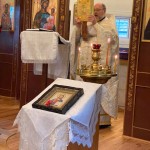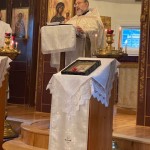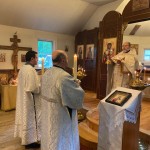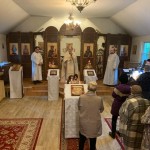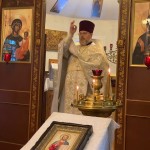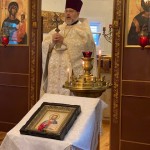On May 30, on the Sunday of the Samaritan Woman, we had a nice liturgical celebration in our temple. Rector of St. George Church, Archpriest Igor Tarasov served the Divine Liturgy. After the Gospel lesson he preached the following homily:
“Christ is risen! Dear brothers and sisters in Christ! Last week, on Wednesday, the Church celebrated feast of the Mid-Pentecost. It is a minor but important feast. It indicates that we are half-way from Pascha to Pentecost. The spiritual importance of that feast is that we did celebrate Christ Resurrection on Pascha and are half-way to celebration of the Descending of the Holy Spirit. We are in some process: spiritually, we had the Resurrection of the Lord on Pascha and now we are preparing to have the Holy Spirit descend on the Apostles. And today, having the Sunday of the Samaritan Woman, we are reflecting upon the importance of the Holy Spirit. That thinking comes from today’s reading from the Gospel where we learn about a conversation between our Lord Jesus and a woman from Samaria”.
“Thus, today’s pretty long Gospel reading may give us a great number of ideas. Our Lord Jesus Christ discussed a number of things with the Samaritan woman beside the Jacob’s well. It would be interesting to note who are the Samaritans. These were people very close to the Jews, but they held a different belief. Although they worshiped the one and true God, they refused to honor the prophets and they recognized only the first five books of the Bible, the Law of Moses. They also claimed that the place of worship must be on Mt. Gorazin and not on Mt. Zion in Jerusalem. Thus the Jews considered them heretics and strangers. We may say that Middle East is full of different religious and ethnic communities living separately. Now we are observing another conflict and hostility between the Jews and the Palestinians. Divisions and hostility are always there, in the Holy Land and it was there in the times of Jesus.”
“It should also be noted that Jesus in His conversation with the Samaritan woman does not change the Jewish opinion that Samaritans are in error. On the contrary He confirms that “salvation is of the Jews” (Jn. 4, 22). But the Lord offers both the Samaritans and the Jews a totally new approach to the faith which is His New Testament. They argued about the Old Testament and the Jews were correct in that argument, but the Son of God, the Messiah whom they both expected, came and now offered to them the new life, the new spirit, the living water”.
“Again we are speaking about the water in these days of the paschal celebration. Today’s Gospel tells us about the Jacob’s well. The wells were always important for the people as the sources of water. Especially in the Middle East, the wells and springs are significant because of their rarity in desert life. In the Scripture they often symbolize the life given by God. But the well mentioned today was primarily the source of the earthly life. Jesus, as a Man was tired and thirsty. He came to the well to get some water. In the course of the conversation with the Samaritan woman, Jesus tells her about another kind of water, the living water, that “Whoever drinks of the water I shall give him will never thirst” (Jn. 4, 14). The “living water” in the language of the Scripture means flowing water, a water from a spring rather from a pond or a cistern. In the spiritual sense it symbolizes true life from God, who is the Source of life”.
“The living water given by Jesus is the gift of the Holy Spirit which believers receive. And the Holy Spirit becomes a Fountain of water which flows with eternal life. Living water is true life from God. It is a life of faith in the New Testament of our Lord Jesus Christ rather than the water from the Jacob’s well, a spirit of the Old Testament. This is why it is a completely new spiritual reality. The Samaritan woman is bothered by the question where to worship God, on which mountain is the proper place of worship. The Lord tells her that “the hour is coming when you will neither on this mountain, nor in Jerusalem, worship the Father”(Jn. 4, 21). The idea of worship only at a specific place is going to give way to the understanding that worship must be in spirit and in truth. Upon the completion of His mission of salvation Jesus is going to bestow the Holy Spirit. In that Spirit the true believers will worship the Father. They will worship the Father also in truth. The truth is Jesus Christ Himself and His revelation”.
“Dear brothers and sisters! Let us then desire to live according to our spiritual call of acquiring the living water given by our risen Lord Jesus Christ. Let us be worthy of the eternal life promised by our Savior. Let us also imitate the Samaritan woman in her thirst for spiritual things, in her readiness to accept the teaching of the Lord. The Church honors her as St. Photini in Greek, or St. Svetlana in Russian. That holy woman became the Disciple of Christ. She was tortured and put to death for her faith. St. Photini’s children were also Christians and they also became the Martyrs. She moved from the Holy Land to Northern Africa where she was martyred. After tortures she was thrown into a well. See, how providential was her Christian life! She began her life in Christ by meeting Jesus Christ Himself beside the well and she ended up being thrown into a well. Dear brothers and sisters, let us therefore worship the true God the Spirit in His spirit and His truth”.
During the Litany of Fervent Supplication, the Rector had a petition beseeching the Lord to spare the faithful from the outbreak of the disease.
The choir nicely performed the Exapostilarion and the Aposticha of Pascha during the time of preparation for Holy Communion.
Following the Liturgy the Rector performed a memorial Litia requested by the Lali Sheehan. After the service Fr. Igor and parishioners enjoyed some delicious Georgian food prepared by Lali in memory of her departed family members.

